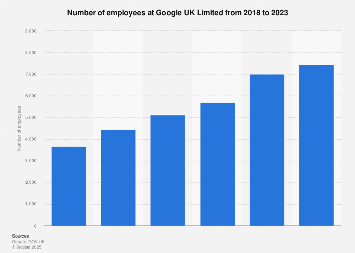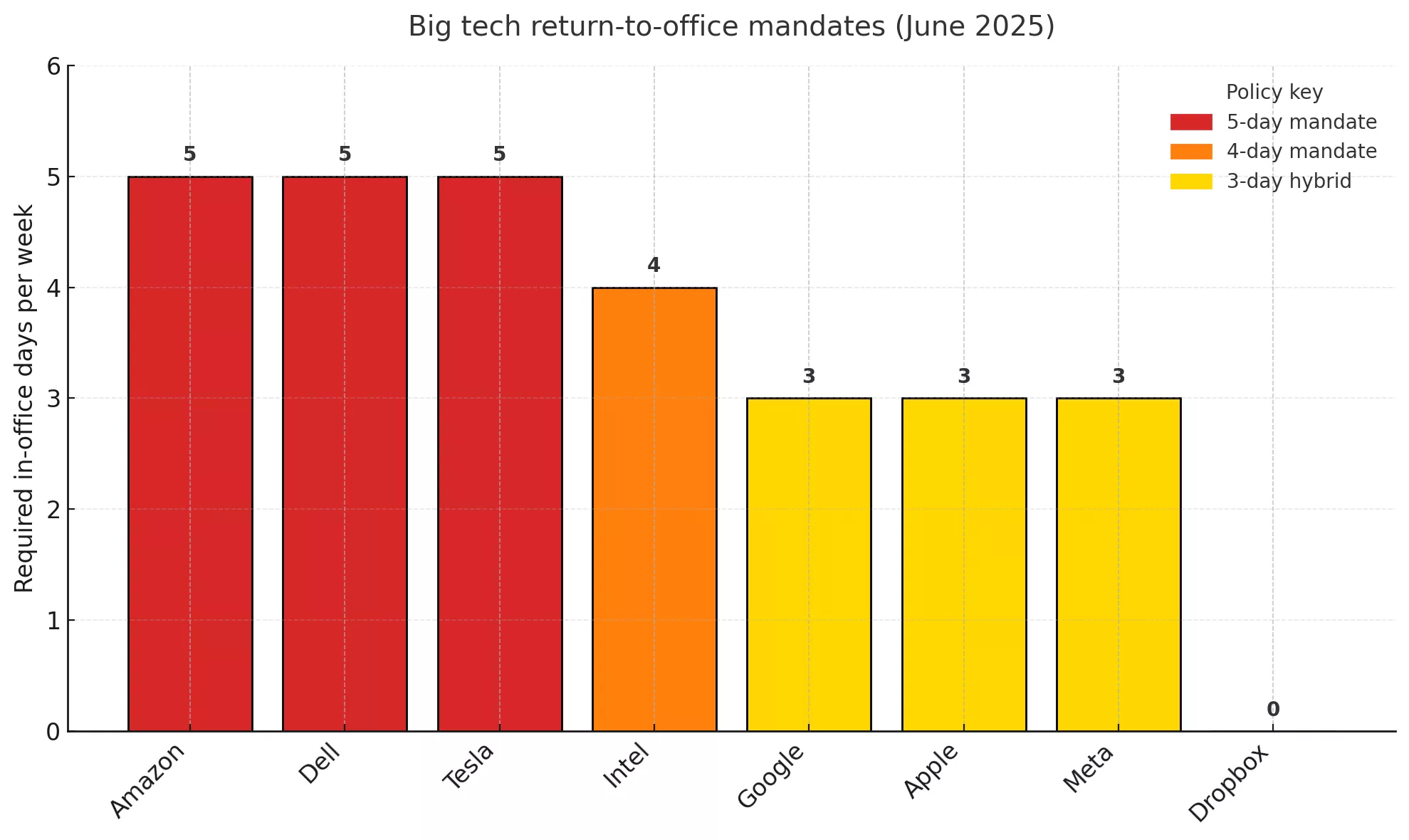Google UK Limited



What’s happened
- Google UK’s annual accounts show that headcount at Google UK Limited fell from 7,422 to 7,029 in 2024 — a reduction of about 393 roles. (UKTN)
- At the same time, Google UK’s revenues rose from £2.81 billion to £2.89 billion, and pre-tax profits increased (exact figure from one source: up to £550 million from £502 million) in the year ending 2024. (Tech.eu)
- Google UK attributed job count reduction to a mixture of job cuts (redundancies), natural attrition, and role changes (restructures). (Tech.eu)
- Despite the workforce reduction, the company is simultaneously announcing large investment in the UK: notably a £5 billion investment into UK artificial intelligence infrastructure and a new data-centre in Hertfordshire. (Tech.eu)
Key Figures
| Metric | Value | Notes |
|---|---|---|
| Headcount 2023 → 2024 | 7,422 → 7,029 | ~393 fewer employees in UK entity (UKTN) |
| Revenue 2023 → 2024 | £2.81 bn → £2.89 bn | Growth despite job cuts (Tech.eu) |
| Profit (pre-tax) | Up from ~£502 m to ~£550 m (one source) | Profit growth while cutting roles (Tech.eu) |
| Investment plan | ~£5 bn into UK & AI infrastructure | Announced concurrently with job adjustments (Tech.eu) |
Why Google UK is cutting jobs / restructuring
Several factors appear to be driving this:
- Efficiency and alignment with priorities
- Google globally has signalled the need to “remove layers”, simplify execution, and allocate resources toward its biggest priorities (e.g., AI) rather than maintain large back-office or lower-growth roles. (Silicon UK)
- In the UK, this seems reflected in the statement that fewer roles, some role changes and attrition contributed to the headcount drop. (UKTN)
- Shift in business & investment focus
- While Google UK is investing heavily (data centre, AI infrastructure), some of the roles may be being reallocated: from older product lines, local roles or support functions into new growth areas, or being offshore/outsourced.
- For example, some UK roles may be impacted by the broader Google decision globally to shift certain roles (engineering, back-office) to lower-cost hubs. (Silicon UK)
- Global cost/control pressures
- Although the UK arm is showing growth in revenue and profit, Google globally is under pressure from slower growth in ad market, rising costs (AI infrastructure, data centres) and competition.
- Job cuts in the UK can be part of a larger group-wide restructuring.
- Natural attrition & role transformation
- The reduction is not purely forced redundancies: Google UK acknowledges natural attrition (people leaving voluntarily) and role changes (some roles eliminated, others changed). (Tech.eu)
- This can make the cuts less blunt and more part of “reshaping” the workforce.
Implications & what it means
- For employees and talent market
- Job reductions mean impacted employees face disruption; slow hiring in certain areas may make internal moves more competitive.
- For the UK tech talent pool, the restructuring suggests even thriving companies (with rising profits) are not immune to cost/strategy pressures.
- It may influence job-seekers to be more cautious about role stability, especially in large tech firms undergoing transformation.
- For Google UK’s business strategy
- By reducing headcount while growing revenue and profit, Google UK may improve its cost-income ratio, freeing up capital for investment (e.g., in AI, infrastructure).
- The large UK investment (e.g., data-centre, AI) implies Google is bullish on the UK market — but the job cuts show a reallocation of resources rather than simple expansion.
- For the UK tech ecosystem
- The data centre and AI investment is positive for the UK (jobs in infrastructure, research, local supply-chain).
- However, job reductions in one part of Google UK may offset job gains in other parts (or move roles elsewhere). The net effect on UK tech employment remains to be seen.
- It signals that large global tech companies may continue to restructure UK operations, which has implications for regional economies and employment.
- For investors and financial markets
- For Google UK, margin improvement and cost discipline can be viewed positively.
- But job cuts in a growth environment may raise questions: Are the cuts about efficiency or a sign of weaker growth in certain business lines? Investors often watch such signals carefully.
Things to watch going forward
- Net job creation vs job reduction: While Google UK cuts ~400 roles, how many new roles (in AI, infrastructure) are created in UK? Are the investments generating UK-jobs, or are roles relocating overseas?
- Role mix change: Which types of roles are being cut? Are they mostly support/back-office, sales, local operations? And which roles are being created/retained (e.g., R&D, AI, data-centre operations)?
- Geographic shift: Are certain UK operations being scaled back or shifted (outsourcing/offshoring) as part of the restructure?
- Impact on the UK tech talent market: How will local talent respond? Does this shift job opportunities to different areas (e.g., data-centre operations in Hertfordshire, AI research in London) vs traditional roles?
- Business performance: Will the cost savings and headcount reduction lead to improved profitability or better investment returns in the UK? Will business growth sustain?
- Employee morale and brand: Large-scale job reductions can affect morale, employer brand, and retention of high performers — important for a company in R&D/AI competition.
- UK public policy/industrial strategy angle: With Google investing heavily in UK infrastructure & AI, government policy and incentives may play a role — job cuts may be scrutinised in context of public investment and expected UK contribution.
Summary
Although Google UK Limited reported growth in revenue and profits for 2024, it cut nearly 400 jobs in its UK workforce, reducing headcount from 7,422 to 7,029. The company describes the reduction as a mix of job cuts, attrition and role changes. At the same time, Google announced a large UK-investment plan (~£5 billion) in AI and infrastructure, including a new data centre in Hertfordshire.
The job cuts are part of a broader restructuring: aligning resources toward key priorities, improving efficiency, and possibly reallocating roles (including offshore). The dual nature of “growth + cuts” suggests that while Google UK is investing for the future, it is also trimming legacy or lower-growth operations.
For the UK technology sector and workforce this presents a mixed signal: on one hand a major global tech firm is backing the UK with large investments; on the other hand it is reducing local roles as it reshapes its operations. The net impact on employment, role quality, and UK-based tech careers depends on how many new roles are created, where they are located, and what types of skills they require.
Here are case-studies of the job cuts at Google UK Limited (and related commentary) and what they indicate for the broader tech sector in the UK.
1. Case Study: Google UK job cuts & financials






Key facts
- According to the company’s UK-entity filings for year ending 2024: head-count fell from 7,422 to 7,029 — a reduction of 393 roles. (UKTN)
- Meanwhile, revenue increased from ~£2.81 billion to ~£2.89 billion. (Tech.eu)
- Pre-tax profits rose (one report quotes ~£550 million up from ~£502 million) in the UK arm. (Tech.eu)
- The cuts took place alongside a major investment plan in the UK — Google announced ~£5 billion investment in UK AI infrastructure, including a new data centre in Hertfordshire. (Tech.eu)
- Google describes the head-count drop as driven by a mixture of job cuts, natural attrition, and role changes / restructuring. (Tech.eu)
Why this matters
- It shows that even when a local business unit is growing (in revenue and profit), head-count reductions can still occur as part of strategic shift or cost rationalisation.
- The juxtaposition of job cuts + major investment signals a reallocation of resources: roles being removed (or changed) to free up capacity for growth areas (e.g., AI, infrastructure) rather than a simple shrink scenario.
- For UK tech-labor market and policy-makers: major global tech firms continue to restructure UK operations, which affects roles, career pathways, local talent markets.
2. Case Study: Global Google restructuring context





Key facts
- At the global level, Alphabet Inc. (Google’s parent) announced ~12,000 job cuts in January 2023. (Sky News)
- In an internal memo (January 2024) CEO Sundar Pichai warned staff to expect more job eliminations as the company “will be investing in our big priorities this year.” (Silicon UK)
- Globally, many teams were subject to “voluntary exit programmes”, role eliminations in core business units, restructuring of ad‐sales, platforms & devices divisions. (Silicon UK)
Why this matters
- The UK job cuts need to be seen in the context of a wider Google/Alphabet re-balancing: shifting from broad growth/hiring to leaner operations with focus on priority areas (AI, infrastructure, cloud).
- It underlines that for employees in tech (including in the UK) stability is no longer guaranteed by “big name” alone — structural shifts at global level propagate locally.
- For policy/labor-market watchers: the “global → UK” pathway matters: local job reductions may link to global strategic decisions rather than solely UK-market conditions.
3. Commentary & Implications
Operational & strategic commentary
- One analyst summary: Google UK is growing revenue and profit, yet cutting ~400 roles. This suggests roles may be shifting — maybe fewer generalist roles, more specialist/AI/data roles, perhaps some offshoring or automation. (Business Quarter)
- Google’s own internal message: cuts are about “removing layers, simplifying execution, aligning with biggest priorities” (from Pichai’s memo). (Silicon UK)
- The investment of £5 billion in UK AI and infrastructure is pitched as job-creating (8,250 jobs per year for UK businesses). But this doesn’t necessarily mean those jobs are Google UK employees — many may be supply-chain, partner or indirect. (Tech.eu)
Labour market / employee commentary
- Employees and unions raise concerns: In earlier UK job cut rounds at Google, there were walk-outs and calls for better consultation. (Silicon UK)
- The trend underscores risk for tech professionals: roles may change, and skills aligned to new priorities (AI/data/infrastructure) may be more secure than legacy roles.
- For talent retention: large companies cutting roles can impact morale, employer brand, internal mobility.
Policy / UK ecosystem implications
- For the UK tech ecosystem: While mega-investment announcements (data centres, AI) are positive, job cuts at established operations raise questions: What’s the net effect on UK employment? Are the new jobs created local, permanent, high-skilled?
- For regional development: The data-centre in Hertfordshire is positive, but transparency might be needed about how many roles are being created vs lost elsewhere.
- For workforce planning: The shift suggests need for up-skilling, reskilling of workforce to align with new priority areas (AI, cloud, infrastructure).
Risks & cautions
- Just because an investment is announced doesn’t guarantee proportional roles in the same local entity — some jobs may be outsourced or elsewhere globally.
- Role cuts might disproportionately impact certain functions, which may create “hollowing out” of particular specialist skills in UK (depending on what is removed vs retained).
- For employees: cuts signal that performance, alignment with new strategy, and agility matter more; planning for career resilience is key.
✅ Summary
- Google UK reduced its head-count by ~393 roles in 2024, despite growing revenue to ~£2.89 bn and rising profits.
- The cuts appear to be part of a wider restructuring — aligning Google UK’s operations with global priorities (AI, infrastructure) while removing roles via attrition, role-changes and redundancies.
- The case highlights that even strong-performing business units in major tech firms are vulnerable to structural change.
- For the UK tech labour market and ecosystem, the dual nature of “job cuts + big investment” raises both opportunities (new investment, new roles) and risks (legacy roles disappearing, uncertain net job effect).
- For employees, the key takeaway is to stay adaptable, align skills with future-oriented areas, and recognise that even large tech employers may restructure rapidly in response to global strategy shifts.
If you like, I can pull together data showing which functions/teams in Google UK are most affected (e.g., sales, engineering, operations) and contrast that with which areas are hiring (AI, data-centre ops) — this might give clearer insight for employees and job-seekers. Would you like me to dig that?

